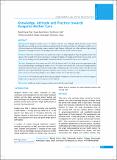Please use this identifier to cite or link to this item:
https://hdl.handle.net/20.500.14356/1644Full metadata record
| DC Field | Value | Language |
|---|---|---|
| dc.contributor.author | Shah, Rakesh Kumar | - |
| dc.contributor.author | Sainju, Nayan Kamal | - |
| dc.contributor.author | Joshi, Sunil Kumar | - |
| dc.date.accessioned | 2023-05-17T07:18:13Z | - |
| dc.date.available | 2023-05-17T07:18:13Z | - |
| dc.date.issued | 2017 | - |
| dc.identifier.citation | ShahR. K., SainjuN. K., & JoshiS. K. (2018). Knowledge, Attitude and Practice towards Kangaroo Mother Care. Journal of Nepal Health Research Council, 15(3), 275-281. https://doi.org/10.33314/jnhrc.v15i3.1173 | en_US |
| dc.identifier.issn | Print ISSN: 1727-5482; Online ISSN: 1999-6217 | - |
| dc.identifier.uri | http://103.69.126.140:8080/handle/20.500.14356/1644 | - |
| dc.description | Original Article | en_US |
| dc.description.abstract | Abstract Background: Kangaroo mother care is an effective and low cost technique which prevents neonate from hypothermia, a leading cause of preventable neonatal mortality. Knowledge and practice of Kangaroo mother care is of utmost importance in developing countries such as Nepal. Purpose of this study was to find out knowledge, attitude and practice of kangaroo mother care among health workers in tertiary health centres in Nepal. Methods: This cross sectional study was carried out in three teaching hospitals in Nepal during the period from January 2016 to April 2016. Doctors and nurses working in Paediatrics/Neonatal and Obstetrics/Gynaecology wards were surveyed using pretested questionnaire. Responses from the doctors and the nurses were compared. Results: Response rate of the survey was 65%. All of the doctors and 95.3% of the nurses who participated in the survey had knowledge about kangaroo mother care.37.7%of the doctors and 48.8% of the nurses thought that this method is only used for neonates with low birth weight (<2500grams) (p= 0.013).Three fourth of the doctors and half of the nurses agreed that KMC is practiced regularly in their ward (p = 0.016). 22.2% participants informed that main reasons for not practicing kangaroo care regularly could be lack of skill and knowledge. Conclusions: We found that general knowledge and attitude of majority of doctors and nurses towards kangaroo mother care was good, however, its practise was not uniform. Keywords: Health care worker; kangaroo mother care; low birth weight; Nepal. | en_US |
| dc.language.iso | en | en_US |
| dc.publisher | Nepal Health Research Council | en_US |
| dc.relation.ispartofseries | Sep-Dec, 2017;1173 | - |
| dc.subject | Health care worker | en_US |
| dc.subject | Kangaroo mother care | en_US |
| dc.subject | Low birth weight | en_US |
| dc.subject | Nepal | en_US |
| dc.title | Knowledge, Attitude and Practice towards Kangaroo Mother Care | en_US |
| dc.type | Journal Article | en_US |
| local.journal.category | Original Article | - |
| Appears in Collections: | Vol. 15 No. 3 Issue 37 Sep-Dec 2017 | |
Files in This Item:
| File | Description | Size | Format | |
|---|---|---|---|---|
| 1173-Manuscript-3084-1-10-20180101.pdf | Fulltext Download | 259.37 kB | Adobe PDF |  View/Open |
Items in DSpace are protected by copyright, with all rights reserved, unless otherwise indicated.
